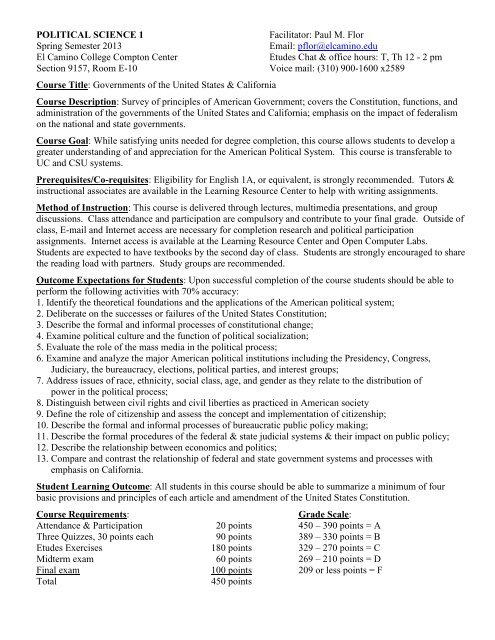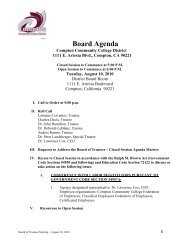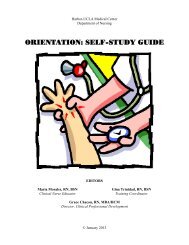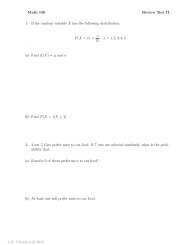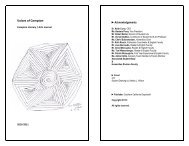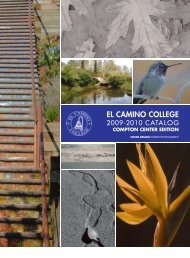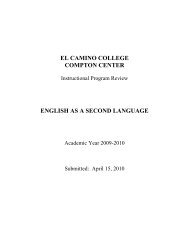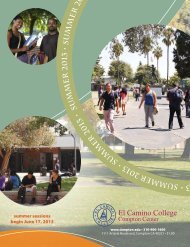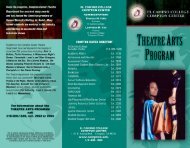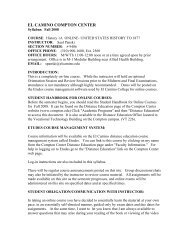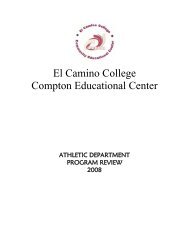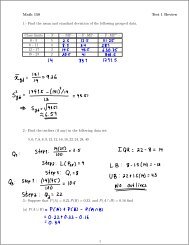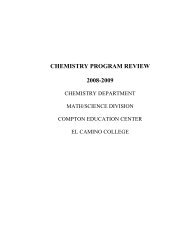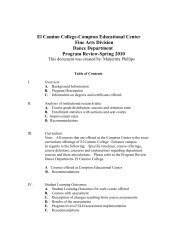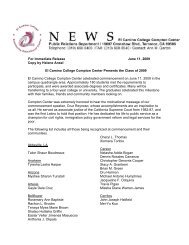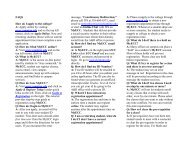Political Science 1, Section 9157 - El Camino College Compton ...
Political Science 1, Section 9157 - El Camino College Compton ...
Political Science 1, Section 9157 - El Camino College Compton ...
You also want an ePaper? Increase the reach of your titles
YUMPU automatically turns print PDFs into web optimized ePapers that Google loves.
POLITICAL SCIENCE 1<br />
Spring Semester 2013<br />
<strong>El</strong> <strong>Camino</strong> <strong>College</strong> <strong>Compton</strong> Center<br />
<strong>Section</strong> <strong>9157</strong>, Room E-10<br />
Course Title: Governments of the United States & California<br />
Facilitator: Paul M. Flor<br />
Email: pflor@elcamino.edu<br />
Etudes Chat & office hours: T, Th 12 - 2 pm<br />
Voice mail: (310) 900-1600 x2589<br />
Course Description: Survey of principles of American Government; covers the Constitution, functions, and<br />
administration of the governments of the United States and California; emphasis on the impact of federalism<br />
on the national and state governments.<br />
Course Goal: While satisfying units needed for degree completion, this course allows students to develop a<br />
greater understanding of and appreciation for the American <strong>Political</strong> System. This course is transferable to<br />
UC and CSU systems.<br />
Prerequisites/Co-requisites: <strong>El</strong>igibility for English 1A, or equivalent, is strongly recommended. Tutors &<br />
instructional associates are available in the Learning Resource Center to help with writing assignments.<br />
Method of Instruction: This course is delivered through lectures, multimedia presentations, and group<br />
discussions. Class attendance and participation are compulsory and contribute to your final grade. Outside of<br />
class, E-mail and Internet access are necessary for completion research and political participation<br />
assignments. Internet access is available at the Learning Resource Center and Open Computer Labs.<br />
Students are expected to have textbooks by the second day of class. Students are strongly encouraged to share<br />
the reading load with partners. Study groups are recommended.<br />
Outcome Expectations for Students: Upon successful completion of the course students should be able to<br />
perform the following activities with 70% accuracy:<br />
1. Identify the theoretical foundations and the applications of the American political system;<br />
2. Deliberate on the successes or failures of the United States Constitution;<br />
3. Describe the formal and informal processes of constitutional change;<br />
4. Examine political culture and the function of political socialization;<br />
5. Evaluate the role of the mass media in the political process;<br />
6. Examine and analyze the major American political institutions including the Presidency, Congress,<br />
Judiciary, the bureaucracy, elections, political parties, and interest groups;<br />
7. Address issues of race, ethnicity, social class, age, and gender as they relate to the distribution of<br />
power in the political process;<br />
8. Distinguish between civil rights and civil liberties as practiced in American society<br />
9. Define the role of citizenship and assess the concept and implementation of citizenship;<br />
10. Describe the formal and informal processes of bureaucratic public policy making;<br />
11. Describe the formal procedures of the federal & state judicial systems & their impact on public policy;<br />
12. Describe the relationship between economics and politics;<br />
13. Compare and contrast the relationship of federal and state government systems and processes with<br />
emphasis on California.<br />
Student Learning Outcome: All students in this course should be able to summarize a minimum of four<br />
basic provisions and principles of each article and amendment of the United States Constitution.<br />
Course Requirements:<br />
Grade Scale:<br />
Attendance & Participation 20 points 450 – 390 points = A<br />
Three Quizzes, 30 points each 90 points 389 – 330 points = B<br />
Etudes Exercises 180 points 329 – 270 points = C<br />
Midterm exam 60 points 269 – 210 points = D<br />
Final exam 100 points 209 or less points = F<br />
Total<br />
450 points
Student Responsibilities: Students must receive an assigned username and password to use for logging into<br />
the course website. Contact the Distance Education office to obtain one.<br />
No make-ups on missed exams or assignments, unless prior arrangements are made with the instructor.<br />
Assignments submitted late will have points deducted, 10% per day.<br />
For example, an assignment worth 40 points submitted 3 days late will be deducted 30% (30% of 40 =<br />
12 points). So the maximum points for a good research paper is 28 points (40 – 12 = 28).<br />
It is the responsibility of the student to drop the course. The instructor is not responsible for dropping students<br />
from the final roster. Students who drop the course must file for a drop or a (W) Withdrawal with admissions<br />
& records. Students who fail to do so and appear on the final grade roster will receive a failing grade of F.<br />
Important dates to remember:<br />
The last day to drop with an enrollment refund is Friday, February 22, 2013.<br />
The last day to add the class is Friday, February 22, 2013.<br />
The last day to drop the class without a notation on student record is Friday, February 22, 2013.<br />
Spring Recess, No classes, is April 6 - 12, 2013.<br />
The last day to drop the class with a notation of W on student record is Friday, May 10, 2013.<br />
Students must request an (I) Incomplete from the instructor prior to Tuesday, May 28, 2013.<br />
Spring Semester ends Friday, June 7, 2013.<br />
Absences and classroom standards: Completion of course materials is very important and critical for<br />
successful passing this course. Students are responsible for material from the textbook as well as online<br />
presentations. At any time during the summer session, a student with three weeks of inactivity will be<br />
dropped from the course. Submit all assignments on time as tardiness will penalized. Instructor reserves the<br />
right to make alterations to any assignments or required readings and/or due dates with ample notification in<br />
the event of unforeseen events.<br />
Methods of Evaluation: All final drafts of written assignments must be submitted word processed, using font<br />
size 12, with standard one-inch margins. Assignments are to be emailed to instructor or submitted as<br />
attachments on Etudes when necessary.<br />
1. Quizzes: There are three quizzes scheduled throughout the course as shown in the syllabus schedule. Each<br />
quiz consists of twenty multiple-choice questions and two short answer questions covering assigned materials<br />
outlined in the syllabus schedule. Failure to bring a scantron, #2 pencil, writing paper, and a pen may equate<br />
to forfeiture of opportunity to take the quiz.<br />
2. Online Exercises: A collection of multiple-choice and true-false questions for each topic presented in the<br />
readings and lectures. All exercises have assigned due dates and the last one must be completed by Monday,<br />
June 3, 2013.<br />
4. Midterm exam is tentatively scheduled for Wednesday, 04/17/13 and shall be administered in class. The<br />
exam consists of 45 multiple-choice questions and three short answer questions covering course content<br />
presented in readings & lectures. Students have a 1 hour, 15 minutes period to complete the exam; students<br />
may use notes but not the textbook.<br />
5. Final exam is Wednesday, 06/05/13, and shall be administered in class. The exam consists of 70 multiplechoice<br />
questions and six short answer questions covering course content presented in readings & lectures.<br />
Students have the entire class period to complete the exam; students may use notes but not the textbook.<br />
Americans with Disabilities Act (ADA): Students with verifiable disabilities requiring accommodations<br />
should make a specific request of the instructor in a timely manner at the start of the semester and at least a<br />
week prior to the identified need. The Special Resource Center is available on campus to meet needs outside<br />
of class. Contact that office as soon as possible.
Course Textbook: Compiled by Paul M. Flor, CHOICES: Custom Resources for American Government.<br />
ISBN: 978-125657816-1, latest edition, Prentice Hall<br />
Course Time Schedule<br />
Session 1 Course Orientation, Syllabus<br />
Topic 10 Mass Media in American Politics<br />
& Requirements Reading for next Session: Chapter 14<br />
First Reading: Chapter 1<br />
04/17/13 Midterm Exam – online on Etudes<br />
Topic 2 Constitutional Democracy<br />
Reading for next topic: Chapter 2<br />
Topic 3 The Living Constitution<br />
Reading for next topic: Chapter 3<br />
Topic 4 American Federalism<br />
Reading for next topic: Chapter 4<br />
Topic 11 Congress, the Legislative Branch<br />
Reading for next topic: Chapter 15 & 16<br />
Topic 12 Presidency, the Executive Branch<br />
Reading for next topic: Chapter 17<br />
Topic 13 Federal Bureaucracy & the Judicial Branch<br />
Reading for next topic: Chapter 18 & 19<br />
Topic 5 Quiz #1<br />
First Amendment Freedoms Topic 14 Quiz #3<br />
& Bill of Rights<br />
Public Policy Making<br />
Reading for next topic: Chapter 5<br />
Topic 6 Equal Rights Under the Law<br />
Reading for next topic: Chapters 6 & 7<br />
Quiz #2<br />
Topic 7 American <strong>Political</strong> Landscape<br />
Reading for next topic: Chapters 8 & 9<br />
Topic 8, <strong>Political</strong> Culture & Ideology<br />
Interest Groups, <strong>Political</strong> Parties,<br />
Reading for next topic: Chapter 10 - 12<br />
Topic 9 Public Opinion & Campaigns & <strong>El</strong>ections<br />
Reading for next meeting: Chapter 13<br />
Economic & Regulatory Policy<br />
Reading for next topic: Chapter 20 & 21<br />
Topic 15 Foreign & Defense Policy Making Process<br />
Social/Domestic Policy Making Process<br />
Reading for next week: Chapter 22<br />
Topic 16 State & Local Governments<br />
Reading for this topic: Chapter 23 - 25<br />
06/05/13 Final Exam & Etudes Exercises<br />
Mission Statement: <strong>El</strong> <strong>Camino</strong> <strong>College</strong>, <strong>Compton</strong> Center, offers quality, comprehensive educational<br />
programs and services to ensure the educational success of students from our diverse community.


